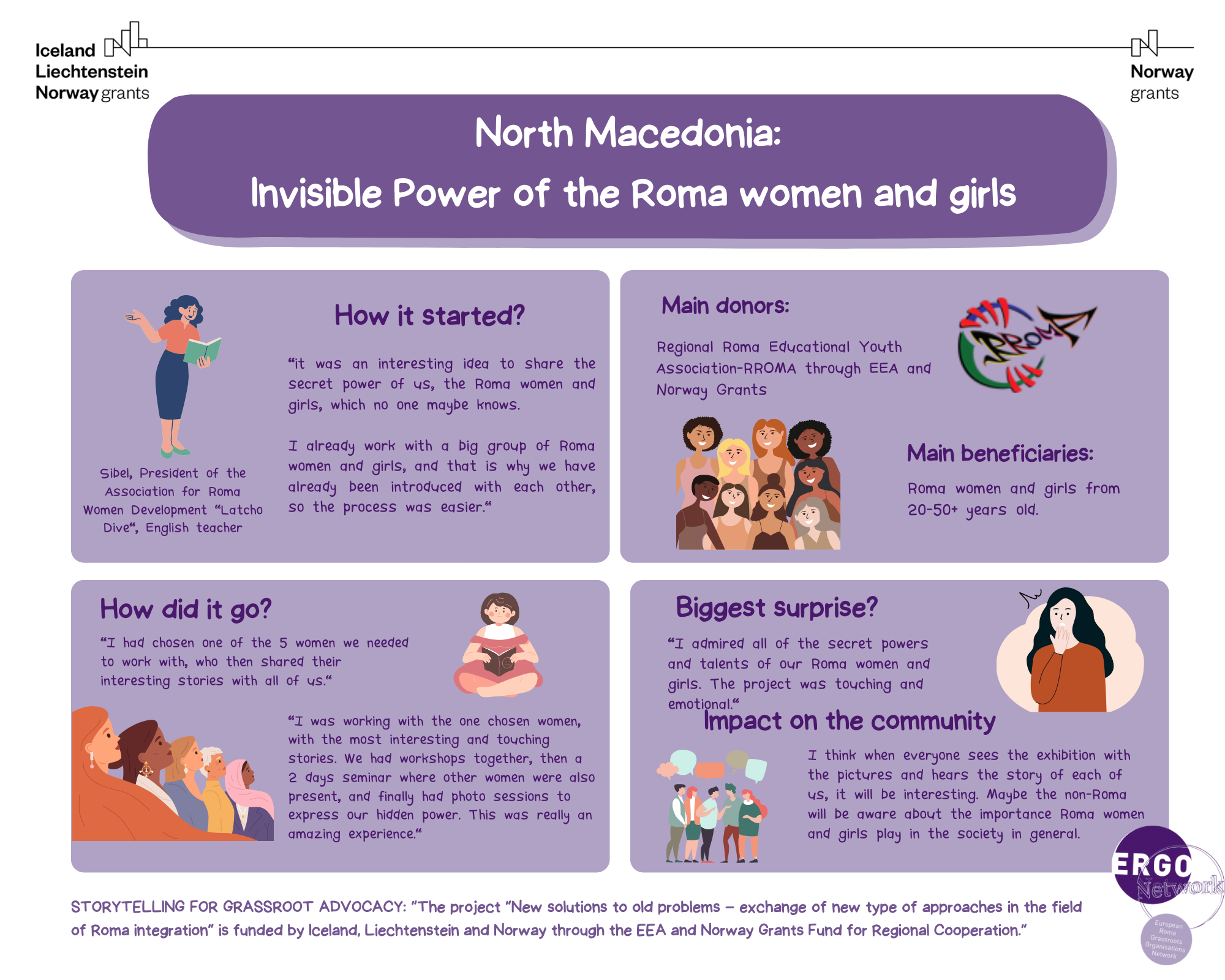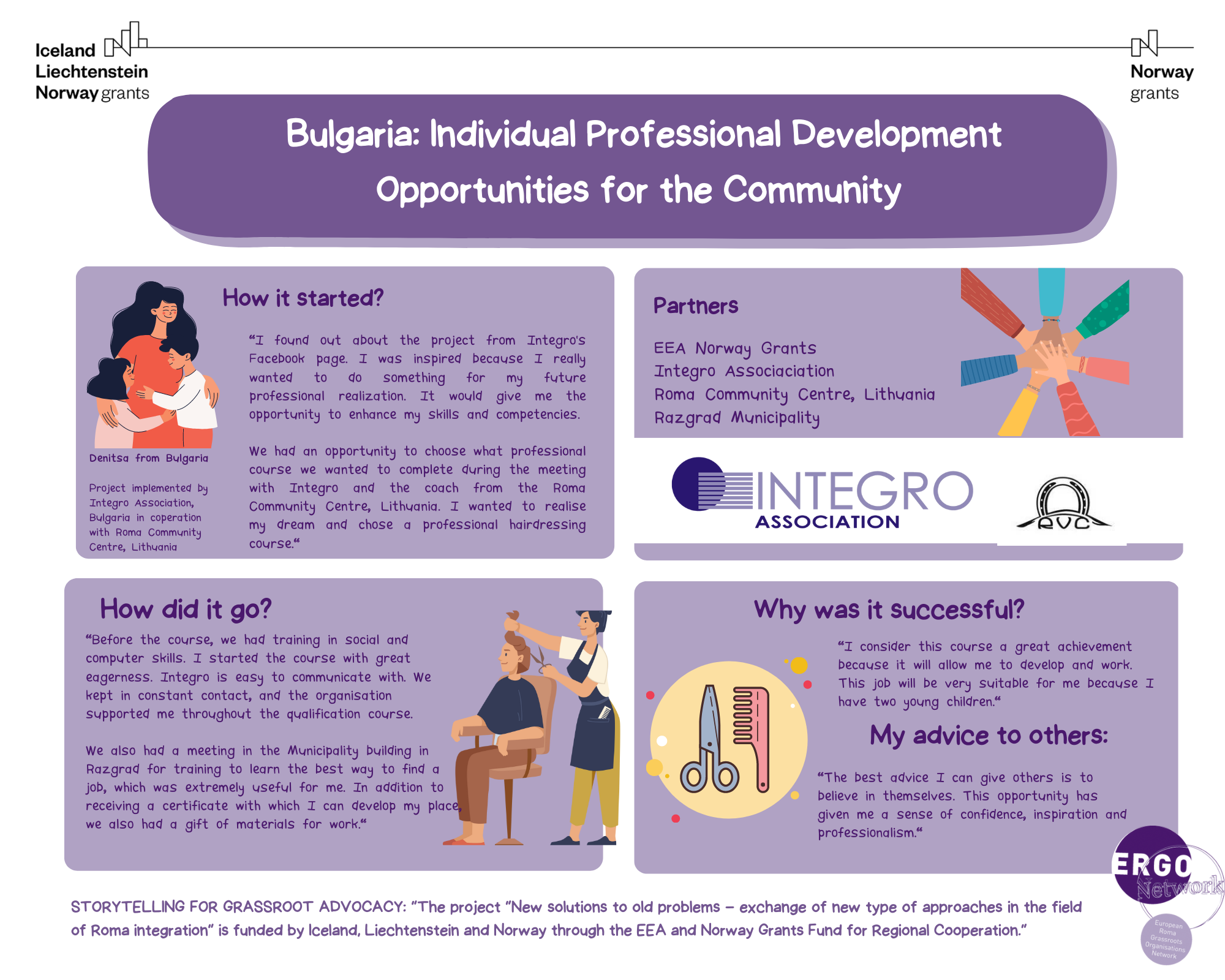Funding of bottom-up approaches:
Ways forward to support Roma inclusion
9 December 2021
On the 9th of December, ERGO Network organized its online round table Funding of bottom-up approaches: Ways forward to support Roma inclusion, in the framework of the project “New solutions to old problems – exchange of new type of approaches in the field of Roma integration”

Over the past 20 years, Roma communities across Europe have seen very few improvements to their living situation, even though many public, private, international, and national funding programmes were aimed at Roma inclusion and empowerment. One of the reasons for the lack of success of such funding programmes is the application of a top-down approach that does not consider the realities and voices of Roma at the grassroots level and comes with a heavy administrative burden. All evaluations of the last EU Framework for National Roma Integration Strategies acknowledged that Roma communities needed to be involved in project design, implementation, and evaluation to bring changes at local level.
The round table served to launch ERGO Network’s new Analysis of funding for bottom-up approaches to Roma inclusion, shedding light on the importance of bottom-up approaches and assessing funding programmes targeted at Roma inclusion. The event reflected on the challenges identified and provided input on how to improve existing funding programmes.

The main recommendations of study are:
General
- All strategic and planning documents on Roma inclusion need to be public
- Donors need to consider weak local governance
- Beyond consultations. Implement participatory research methods for needs and strategic development
- Detailed approaches with implementation plans, not general guidance, and concepts
- More resources, funding, and human capacity, for community-led approaches
European Union
- Any ESIF funds being managed by local municipalities should use a community-led and participatory approach
- Good governance support should be highly recommended with any funding managed by local municipalities
- Desk Officers, Managing Authorities, and NRCPs need specific guidance on what is CLLD and how to implement them
- EU needs a detailed plan that defines the concepts of participation, empowerment, and bottom-up approaches and how to ensure they will be implemented
- Monitoring Committees should be more independent, transparent, have representative from Roma community
National Governments
- There should be a defined Roma inclusion budget with corresponding implementation plans, indicators, and monitoring system
- Go beyond Monitoring Committee requirements
- Develop a strong cooperation with RCM
- Mainstream project need specific Roma inclusion targets
- Conduct campaigns with local governments and community members on the importance of Roma inclusion to reduce the barrier of bias and antigygpsism
State Development Agencies
- Develop approaches and priorities outside of the EU agenda
- Should have public and detailed documents on their approach to Roma inclusion
- Mainstream social inclusion strategies need details on how they ensure the impact on Roma inclusion
- Longer-term investments that use community-led and participatory approaches
- Shift the priority of their investment from bilateral cooperation to more focus on setting inclusion agendas
Intergovernmental Organizations
- A new long-term and collaborative initiative to be develop with a focus on community-led, participatory, antidiscrimination, and empowerment approaches
- Develop agendas based on their organizational values not EU or other institutional agendas
Private Foundations
- Increase transparency in their funding approaches and strategies for Roma inclusion
- Implement measures with the goal to test alternative approaches that can be shared and scaled
- Larger portion of funding should go to supporting community organization’s operational and human capacities. Especially, core funding.

The full research report will be officially launched at the beginning of 2022.
The conference was very well attended with over 70 participants, and it brought together ERGO Network national members from the grassroots level in many European countries, as well as other national practitioners, private donors, European civil society organisations, EU policymakers from the European Parliament and the European Commission, and other stakeholders.
If you attended this event, or watched the recording, don’t forget to let us know what you thought about it by filling in this evaluation form. Thank you!
See more:
For more information about this event, please don’t hesitate to contact us: info@ergonetwork.org
 This event is kindly supported by Iceland, Liechtenstein and Norway through the EEA and Norway Grants Fund for Regional Cooperation. This event is kindly supported by Iceland, Liechtenstein and Norway through the EEA and Norway Grants Fund for Regional Cooperation.
The project “New solutions to old problems – exchange of new type of approaches in the field of Roma integration” is funded by Iceland, Liechtenstein and Norway through the EEA and Norway Grants Fund for Regional Cooperation. |
 This initiative has received financial support in the framework of the project “New solutions to old problems”. The project “New solutions to old problems – exchange of new type of approaches in the field of Roma integration” is funded by Iceland, Liechtenstein and Norway through the EEA and Norway Grants Fund for Regional Cooperation.
This initiative has received financial support in the framework of the project “New solutions to old problems”. The project “New solutions to old problems – exchange of new type of approaches in the field of Roma integration” is funded by Iceland, Liechtenstein and Norway through the EEA and Norway Grants Fund for Regional Cooperation.

















 This event is kindly supported by Iceland, Liechtenstein and Norway through the EEA and Norway Grants Fund for Regional Cooperation.
This event is kindly supported by Iceland, Liechtenstein and Norway through the EEA and Norway Grants Fund for Regional Cooperation.
